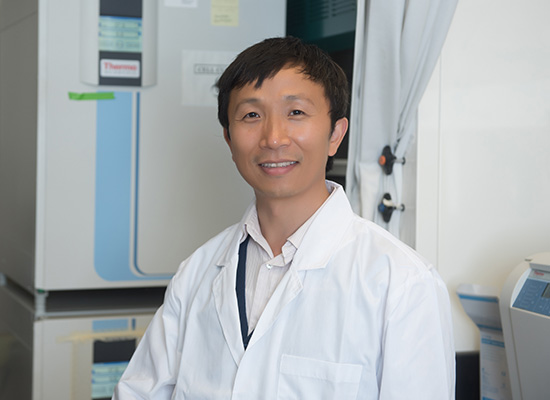Faculty spotlight: Professor of Pharmaceutical Sciences Zhengping Yi
The following interview with Dr. Zhengping Yi, Wayne State professor of pharmaceutical sciences, was conducted by PharmD student Victoria Tufegdzich and originally published in the January 2021 edition of The Student Pharmacist.

Where did your career begin, and how has it unfolded to lead you to where you are today?
I became very interested in science when I was a high school student and joined the high school Olympic Chemistry Competition Team. Later, I was admitted to the Chemistry Program at Nanjing University, one of the top 10 universities in China, and obtained my PhD there. After graduation, I joined Purdue University as a postdoc-fellow in Biochemistry in 2000, and joined the University of Texas Health Science Center at San Antonio as a postdoc-fellow in Proteomics & Diabetes in
2004. At the end of 2004, I moved to Arizona State University as an Assistant Research Scientist, and was promoted to Research Assistant Professor in 2005. In January 2011, I joined Wayne State University as an Associate Professor of the Department of Pharmaceutical Sciences, Division of Pharmacy, Eugene Applebaum College of Pharmacy and Health Sciences. I have been promoted to Full Professor with Tenure since August 2015 due to my outstanding progress in research/scholarship, mentoring/teaching, and service.
What has been the most rewarding aspect in your research/career?
The most rewarding aspect in my career is the scientific discoveries I have made over the years, with the help from my lab members (such as research faculty, postdoc-fellows, students, etc.) and collaborators. Science is fun. I enjoy the sparking of ideas, generating hypotheses, designing experiments to test the hypothesis, analyzing data, interpreting results, and finally sharing the finding with the scientific community. I have to admit that most of the experiments were failures and the results were not what we thought they should be; however, when the experiments are successful, it is a true pleasure.
What has been the most challenging aspect in your research/career?
The most challenging aspect in my career is finding the resources for scientific research. Science is fun; however, it is not free and easy. Various resources are needed, such as personnel, equipment, supplies, etc. I have come up with novel, significant ideas and generated convincing data after numerous trial and error, which has enabled me to secure funding from the United States National Institutes of Health (NIH), the National Institute of Diabetes and Digestive and Kidney Diseases (NIDDK), as well as the American Diabetes Association (ADA).
How do you see your teaching progressing over the years to come?
In the beginning, my teaching was mainly lecturing, and I would try to give students as much information as possible during the lecture time. During the past several years, I have incorporated active learning (e.g., team match, polls, etc.) to help students become more engaged and understand the materials.
What are some of your greatest achievements?
I have developed and maintained a vigorous independent research program in the areas of insulin signaling, insulin resistance, obesity, diabetes, and proteomics. Insulin resistance lies at the base of the array of diseases or pre-disease conditions such as obesity, dyslipidemia, hypertension, cardiovascular disease, some cancers, and type 2 diabetes (T2D). T2D has become a world and US epidemic. More than 10% of US adults (26 million) currently have T2D, and projections indicate that the US diabetes prevalence may increase to ~30% in 2050 (www.cdc.gov). Intracellular actions of insulin are mediated by modifications of regulatory proteins through protein-protein interactions, as well as protein phosphorylation and dephosphorylation.
My research focuses on the role of novel protein-protein interactions and phosphorylation in insulin signaling in the development of skeletal muscle insulin resistance and type 2 diabetes. My research has improved our understanding of the biology of insulin signaling and the pathogenesis of insulin resistance and T2D, and promises to discover novel drug targets to prevent and treat metabolic diseases. My research utilizes a combination of human clinical studies (directly measure human physiology/pathophysiology), in vitro cell studies (for detailed mechanistic studies), and cutting-edge proteomics (for global analysis of cell signaling & for unbiased discovery). Proteomics offers the capability to simultaneously quantify multiple proteins, protein-protein interactions, and protein phosphorylation, providing a better picture of complex protein networks.
Over the years, I have published 62 papers in peer-reviewed scientific journals, received three clinical/translational R01 awards from NIH/NIDDK, as well as two clinical/translational awards from ADA. In addition, I have mentored, and am currently mentoring, junior faculty members, PhD students, Master’s students, undergraduate students, PharmD students, and post-doctoral fellows. Moreover, I have been invited to serve as a standing study section member of NIH and ADA. NIH and ADA study sections are highly selective. As a study section member, I review grant applications submitted to the NIH and ADA, and make recommendations on these applications to the appropriate NIH national advisory council or ADA foundation. Finally, I have served as a team captain for Step Out: Walk to Stop Diabetes/Tour de Cure each year, a community-outreach event to help over 30 million Americans living with diabetes today.
What advice do you have for prospective students interested in becoming a health professional?
Health professionals have been an indispensable part of the workforce for society, saving lives and improving physical and mental health of numerous individuals and their loved ones. Health professionals are essential during the COVID-19 pandemic to keep the nation and communities functioning, and will continue to play a critical role in the recovery. If you would like to be in a profession that can make a positive impact on countless lives, a health profession is one of the best choices. As Ray Bradbury, a famous and inspiring writer, pointed out: “Love what you do and do what you love.” A bright future is waiting for you!

